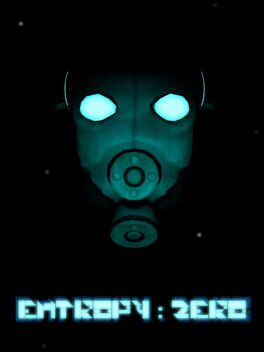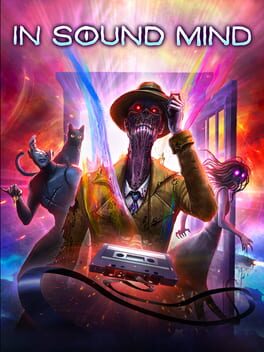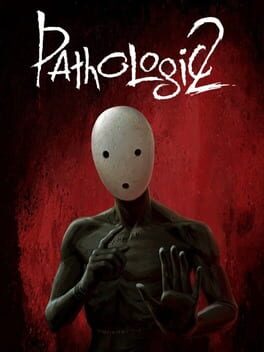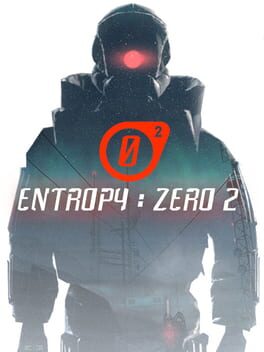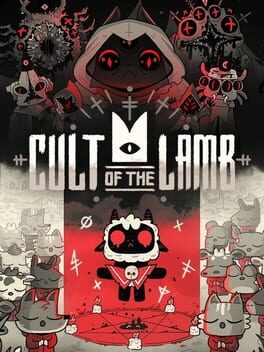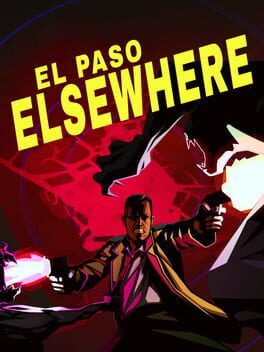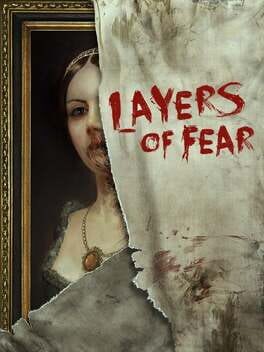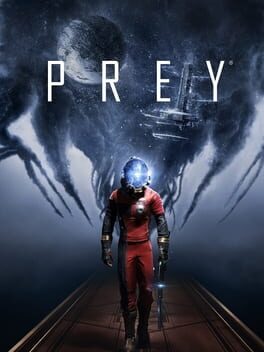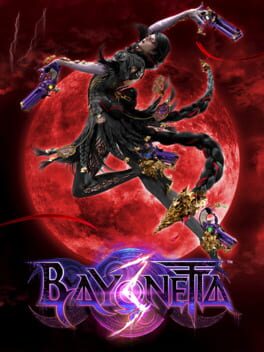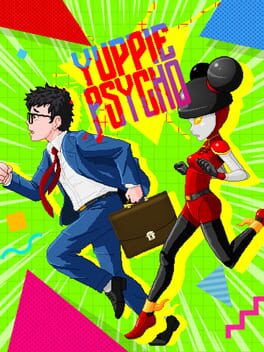Jack_OConnor
2017
I can see why this is classified as one of the better HL2 mods; the atmosphere is great, the combat is more weighty than the vanilla game due to the premise, and some of the set pieces are incredibly interesting.
It's not without flaws, though; both of the bosses are bad, ranging from slightly annoying to not even knowing if you're progressing till it's already over, and playing on the difficulty that makes the game most interesting leads to it being so wholly unfair that anyone who played on it would be forgiven for either cheating or giving up at some point.
It's not without flaws, though; both of the bosses are bad, ranging from slightly annoying to not even knowing if you're progressing till it's already over, and playing on the difficulty that makes the game most interesting leads to it being so wholly unfair that anyone who played on it would be forgiven for either cheating or giving up at some point.
2021
Alan Wake is one of those games where the sheer intrigue of where it's going is practically the only thing keeping you invested in it.
It has very little else going for it; the gameplay gets boring really, really quickly, to the point it almost becomes a competition with itself for worst encounter with its own combat. Lots of official game designers say that the best way to make horror game combat is to make it just frustrating enough that you feel helpless, but not so much that combat is downright annoying: Alan Wake went so off into being annoying that the end of the game corrects itself by giving you enough items that make monsters leave you alone that you could easily just walk by them without hassle.
The story isn't necessarily good, either, but it has a weird quality to it that makes it interesting enough to see to the end. So many characters are either one note or just weird for the sake of it that you can't really like any but about three of them, but the fact the writing of the game is in a mobius-strip like loop and that it has an effect on how literally everything else is supposed to go is the strongest reason to finish it.
It has very little else going for it; the gameplay gets boring really, really quickly, to the point it almost becomes a competition with itself for worst encounter with its own combat. Lots of official game designers say that the best way to make horror game combat is to make it just frustrating enough that you feel helpless, but not so much that combat is downright annoying: Alan Wake went so off into being annoying that the end of the game corrects itself by giving you enough items that make monsters leave you alone that you could easily just walk by them without hassle.
The story isn't necessarily good, either, but it has a weird quality to it that makes it interesting enough to see to the end. So many characters are either one note or just weird for the sake of it that you can't really like any but about three of them, but the fact the writing of the game is in a mobius-strip like loop and that it has an effect on how literally everything else is supposed to go is the strongest reason to finish it.
2021
2021
A very charming, if janky, bite-sized indie game that I believe works better as a puzzle game rather than a horror game; the reason being that the later levels focus more on open areas that require you to use all the mechanics learned up until that point to progress (including the monster of the level) which severely detracts from the general atmosphere and makes it feel like an escape room with strange rules and a sense of humor.
I also believe the story takes a significant nose-dive about halfway through the game, given the theme being a more extreme personification of the mental troubles of this therapist's patients to a government conspiracy and focusing on the therapist himself, despite the lack of characterization for him to make the final parts of the game as climactic as it wants you to believe.
I also believe the story takes a significant nose-dive about halfway through the game, given the theme being a more extreme personification of the mental troubles of this therapist's patients to a government conspiracy and focusing on the therapist himself, despite the lack of characterization for him to make the final parts of the game as climactic as it wants you to believe.
2019
It's extremely difficult to explain exactly why Pathologic is so appealing in any sense, because without the context of having played it, writing down why you like it makes you seem like a masochist and this game a bizarre form of torture. Going into detail about how a good half of the game will be you in some variation of destitute, hungry, sick, constantly babysitting characters in a dice roll that goes increasingly out of your favor, etc. just makes me sound insane for not only playing it for hours on end, but loving it.
But I do love it specifically because of those aspects: the game is so cleverly written, with each character either knowing something that requires you to keep them alive just to help the others you do care for or simply liking them to begin with, just to constantly challenge to see how far you'll go to do so. Other games have attempted to make the player feel bad for doing things, whether it be in a plot sense or a gameplay segment: Pathologic is that entire segment, non-linear and completely up to your own discretion.
It simply puts you in situations you cannot control and DEMANDS that if you truly care about the people it has provided for you, then prove it: do things you wouldn't just to get ahead, be morally ambiguous, do something the truly desperate would do. Through that, it manages to make you feel the panic of the situation through how difficult and unwavering it is and how it will not hesitate to take away something you cared for, ESPECIALLY if you only put in the barest amount of effort in to protect it.
None of this is mentioning how good the characters, atmosphere, and general competency when it comes to presenting you this world and the people in it.
The only things stopping me from making it a perfect five is that the game is pretty buggy; every time I closed out of it, it would simply freeze and I would have to use task manager to end the process, and the fact the game is so experimental I can't see anyone except fringe weirdos enjoying it enough to finish it like I did. Other than that, I see no other word to use except masterpiece,
But I do love it specifically because of those aspects: the game is so cleverly written, with each character either knowing something that requires you to keep them alive just to help the others you do care for or simply liking them to begin with, just to constantly challenge to see how far you'll go to do so. Other games have attempted to make the player feel bad for doing things, whether it be in a plot sense or a gameplay segment: Pathologic is that entire segment, non-linear and completely up to your own discretion.
It simply puts you in situations you cannot control and DEMANDS that if you truly care about the people it has provided for you, then prove it: do things you wouldn't just to get ahead, be morally ambiguous, do something the truly desperate would do. Through that, it manages to make you feel the panic of the situation through how difficult and unwavering it is and how it will not hesitate to take away something you cared for, ESPECIALLY if you only put in the barest amount of effort in to protect it.
None of this is mentioning how good the characters, atmosphere, and general competency when it comes to presenting you this world and the people in it.
The only things stopping me from making it a perfect five is that the game is pretty buggy; every time I closed out of it, it would simply freeze and I would have to use task manager to end the process, and the fact the game is so experimental I can't see anyone except fringe weirdos enjoying it enough to finish it like I did. Other than that, I see no other word to use except masterpiece,
2022
You could tell someone that this was an official expansion to HL2 and, as long as they don't look too hard, they'd believe you.
The newer weapons feel satisfying and creative to use to the point of one being just a general problem solver, the voice acting is good enough to fool anyone to believe this is a professional project, and the story is deep enough that there are entire branches dependent on a side character you can ignore soon after meeting.
The only gripes I can think of after playing is that there were occasional bugs with sprinting and some segments dragged on too long, but I can consider them nitpicks. The fact that this was made for free is astounding.
The newer weapons feel satisfying and creative to use to the point of one being just a general problem solver, the voice acting is good enough to fool anyone to believe this is a professional project, and the story is deep enough that there are entire branches dependent on a side character you can ignore soon after meeting.
The only gripes I can think of after playing is that there were occasional bugs with sprinting and some segments dragged on too long, but I can consider them nitpicks. The fact that this was made for free is astounding.
2022
It's impressive how cleanly this game is split in half between a management simulator and a roguelike, and how both of these halves are half-baked.
In the beginning, it's not really noticeable; both of the halves are so easy to do that you don't feel pressured to really min-max a certain way and can just do what you want. I only died maybe exactly four times to all five of the bosses, and I never died to a regular enemy unless I was doing a specific challenge.
Where it really drops off is the second half, where it makes you focus more on the management part: the problem with that being that by that point you've probably made your entire base autonomous and you only intervene to level up certain followers to act as keys to continue the roguelike part.
At that point, it feels more like an idle game where you just have to wait to progress, and all the fun drops out.
In the beginning, it's not really noticeable; both of the halves are so easy to do that you don't feel pressured to really min-max a certain way and can just do what you want. I only died maybe exactly four times to all five of the bosses, and I never died to a regular enemy unless I was doing a specific challenge.
Where it really drops off is the second half, where it makes you focus more on the management part: the problem with that being that by that point you've probably made your entire base autonomous and you only intervene to level up certain followers to act as keys to continue the roguelike part.
At that point, it feels more like an idle game where you just have to wait to progress, and all the fun drops out.
2023
This feels like a really loving homage to something the creators hadn't actually played in years (Max Payne, obviously) and just developed off of the memory of it in their heads.
Most elements of the game feel pretty superfluous: the slow-mo is pretty useless because most enemies are melee, meaning you use it to point at enemy's heads and immediately kill them before they become even remotely threatening. That, and the fact most of the monsters go down in a matter of maybe 3 shots to the head with any given weapon, make the combat pretty boring and easy. Legitimately the only times I died are when the levels were designed to have the monsters ambush you around corners where they'd chop off all your health before you could react, and I never ran out of ammo or health pickups. If you want to know specifically how redundant some mechanics are, rolling and diving a specific number of times are some of the rarer achievements for this game on Steam.
Plus, the game just goes on for too long; I was somewhat interested in the story and even liked some of the characters enough to get invested in some conversations early on, but about 2 hours of content could be cut and nothing could be lost. Seriously, there are more scenes where the protagonist is just talking to himself like he's in a soap opera where he's the only character than him interacting with ANYONE ELSE IN THE GAME.
Most elements of the game feel pretty superfluous: the slow-mo is pretty useless because most enemies are melee, meaning you use it to point at enemy's heads and immediately kill them before they become even remotely threatening. That, and the fact most of the monsters go down in a matter of maybe 3 shots to the head with any given weapon, make the combat pretty boring and easy. Legitimately the only times I died are when the levels were designed to have the monsters ambush you around corners where they'd chop off all your health before you could react, and I never ran out of ammo or health pickups. If you want to know specifically how redundant some mechanics are, rolling and diving a specific number of times are some of the rarer achievements for this game on Steam.
Plus, the game just goes on for too long; I was somewhat interested in the story and even liked some of the characters enough to get invested in some conversations early on, but about 2 hours of content could be cut and nothing could be lost. Seriously, there are more scenes where the protagonist is just talking to himself like he's in a soap opera where he's the only character than him interacting with ANYONE ELSE IN THE GAME.
2014
It's a fun, tiny romp that becomes more interesting when you remember it came out around the time roguelites were first growing into a genre, but I think it's more frustrating than its worth to actually finish for one simple reason alone: the turrets.
See, the animal enemies are interesting enough, but the game seems to hard-focus on a stationary enemy that has weird shooting patterns and needs to be hit in a very specific spot to kill from the second level onward. This culminates in a mid-game boss that is essentially 4 of them that's allowed to walk around and kill you with splash damage, all the while a new turret slows you down so the projectiles are basically guaranteed to hit. FUCK. THAT.
See, the animal enemies are interesting enough, but the game seems to hard-focus on a stationary enemy that has weird shooting patterns and needs to be hit in a very specific spot to kill from the second level onward. This culminates in a mid-game boss that is essentially 4 of them that's allowed to walk around and kill you with splash damage, all the while a new turret slows you down so the projectiles are basically guaranteed to hit. FUCK. THAT.
2022
2016
2017
While this is technically a replay, it's almost entirely me starting fresh with little memory of the first time I played it to truly enjoy the level of depth the game has. And if there's one thing Prey does right, it's the depth of nearly each and every element it offers you.
There is little to no wasted effort put into every faucet of what you can do in the game; each situation can be approached in ways that require creative thinking, using the guns and abilities in ways they weren't built for but you can use simply because it encourages creative thinking is astounding. Even extremely minute details that seem to serve no function outside of world-building, such as the crew listings that allow you to pin specific npcs, are just another solution to whatever problem you might be facing.
Even the characters are fully realized. Despite me not agreeing with all of their ideas, I could feel the interpersonal history of them as I played and understood exactly what might drive them to do these things. The only ones I didn't feel that way for were the ones specifically designed not to do so, which I won't go into detail for because I try to be as spoiler-free as possible.
Legitimately, the only thing I think that keeps it from being absolutely perfect is the Typhon. They're not bad enemies, per se. Their designs and concepts are cool, the mystery surrounding them gives way to the atmosphere, all the good things to be expected from an immersive sim that has some horror elements. The one thing they lack is an identity: despite the fact that they were built on and studied so heavily, I can't fully say I thought them as anything more than creepy, psychic xenomorphs who just killed people and reproduced in weird ways to take over structures built by other species. They weren't bad, but they certainly weren't interesting enough for me to buy into wanting to preserve them or agree with some npcs about understanding them.
All in all, I would say this is definitively Arkane's best work. They put their all into this, and they delivered. Even if I enjoy Dishonored more, and even if I don't think it'll get the recognition it deserves cause of the im-sim curse, I will never disagree or argue that anything tops this in their lineup.
There is little to no wasted effort put into every faucet of what you can do in the game; each situation can be approached in ways that require creative thinking, using the guns and abilities in ways they weren't built for but you can use simply because it encourages creative thinking is astounding. Even extremely minute details that seem to serve no function outside of world-building, such as the crew listings that allow you to pin specific npcs, are just another solution to whatever problem you might be facing.
Even the characters are fully realized. Despite me not agreeing with all of their ideas, I could feel the interpersonal history of them as I played and understood exactly what might drive them to do these things. The only ones I didn't feel that way for were the ones specifically designed not to do so, which I won't go into detail for because I try to be as spoiler-free as possible.
Legitimately, the only thing I think that keeps it from being absolutely perfect is the Typhon. They're not bad enemies, per se. Their designs and concepts are cool, the mystery surrounding them gives way to the atmosphere, all the good things to be expected from an immersive sim that has some horror elements. The one thing they lack is an identity: despite the fact that they were built on and studied so heavily, I can't fully say I thought them as anything more than creepy, psychic xenomorphs who just killed people and reproduced in weird ways to take over structures built by other species. They weren't bad, but they certainly weren't interesting enough for me to buy into wanting to preserve them or agree with some npcs about understanding them.
All in all, I would say this is definitively Arkane's best work. They put their all into this, and they delivered. Even if I enjoy Dishonored more, and even if I don't think it'll get the recognition it deserves cause of the im-sim curse, I will never disagree or argue that anything tops this in their lineup.
2020
An honestly and truly impressive effort for one person to make such a complex AI, even if everything else around it is subpar or pre-bought. It's fascinating to see all the depth in the stalker, both in killer and docile states, as each has different reactions and logic that are apparently advanced enough to finish the game without ever really angering her.
If anything, I wish to see this concept, and the developer itself, build up from it; I shudder to imagine what they could do given more advanced resources, or even a team, to make what could possibly be one of the most intelligent horror antagonists ever made.
If anything, I wish to see this concept, and the developer itself, build up from it; I shudder to imagine what they could do given more advanced resources, or even a team, to make what could possibly be one of the most intelligent horror antagonists ever made.
2022
One of the biggest props I can give this game is that it managed to break the mold of Bayonetta games just being the first one with a taped-on mechanic or more enemies to fight: the demon summoning and masquerade system makes mixing up fights even better to the point it actually becomes DETRIMENTAL to rely on it, making the game still encouraging smart combos with the new, OP mechanics.
I think there's too many gimmick sections and playing as Viola is genuinely the least fun part about the entire game, even when you learn her nuances, but it's still loads of fun if you can forgive it for basically having ADHD.
I think there's too many gimmick sections and playing as Viola is genuinely the least fun part about the entire game, even when you learn her nuances, but it's still loads of fun if you can forgive it for basically having ADHD.
2019
